|
|
|
Sort Order |
|
|
|
Items / Page
|
|
|
|
|
|
|
| Srl | Item |
| 1 |
ID:
110287


|
|
|
|
|
| Publication |
2011.
|
| Summary/Abstract |
Worldwide filing of patent applications and the ensuing invalidation requests have seen staggering growth over the last decade. The result is increasing patent backlog, deteriorating patent quality and an uncertain economic environment. Patent application review is an integral part of the examination procedures undertaken by patent offices before a patent grant is given. Prior art search is a complex and time consuming part of this process. Crowdsourcing this critical stage is a valuable opportunity to render the patent application review process more efficient. This paper describes the crowdsourcing phenomenon and details how it can aid patent review. The open source review pilot projects of the USPTO and JPO are presented in order to assess the potential of opening prior art search to the wider community of experts and practitioners. Public-private partnerships between patent offices and companies managing online review communities are proposed as a valuable opportunity to leverage the benefits of open review while providing sufficient incentives and quality assurances to yield useful contributions.
|
|
|
|
|
|
|
|
|
|
|
|
|
|
|
|
| 2 |
ID:
154713


|
|
|
|
|
| Summary/Abstract |
Building on recent discussions of the role of public-private partnerships in governance, this article argues that we must be more critical of the goals set by PPPs, and pay closer attention to the ways in which gender-based inequalities are obscured or overlooked in the construction of global policy strategies. In particular, the Group of 8's New Alliance for Food Security and Nutrition pledges to “act upon the critical role” played by women. Yet this article reveals that the New Alliance partnerships offer little in terms of substantive goals that address the gender inequalities experienced in rural land and labor markets, and instead appear to favor the expansion of trade without reference to the implications for rural food security.
|
|
|
|
|
|
|
|
|
|
|
|
|
|
|
|
| 3 |
ID:
158480
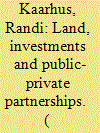

|
|
|
|
|
| Summary/Abstract |
Influential discourses present Foreign Direct Investment (FDI) as essential for agricultural development in Africa; a parallel, critical debate on ‘land rushes’ has denounced Land Grabs, demanding increased accountability in FDI-based land deals. This article explores an initiative located in central Mozambique, the Beira Agricultural Growth Corridor (BAGC). It shows how the international fertiliser company Yara set out to enrol actors at different levels in business, governance and agricultural development into BAGC as a public-private partnership to promote commercial agriculture. Very soon, however, Yara made shifts in its engagement and market strategy, leaving the BAGC initiative to supporting donors and local producers. The analysis presented here shows how the tension between ‘patient-capital’ requirements, high risks and low immediate returns have shaped this case over time – in a context of a national political economy framed by extractive-resource dynamics.
|
|
|
|
|
|
|
|
|
|
|
|
|
|
|
|
| 4 |
ID:
154790
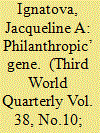

|
|
|
|
|
| Summary/Abstract |
Climate change and population growth have prompted calls for African countries to embrace a ‘new Green Revolution’ in order to promote food security. What is ‘new’ about this new Green Revolution? What configurations of capital, the state, agribusiness, and the law define this period of agricultural transition? In this new Green Revolution, I argue, there is a proliferation of new forms of capital – biocapital and philanthrocapital – that integrate biotechnology with philanthropy to create market value. These shifts are engendered by philanthropic giving, in the form of donated genetic material for the development of ‘pro-poor’ biotechnology which normalises seed as commodity, and legislative reform that renders seed patentable material.
|
|
|
|
|
|
|
|
|
|
|
|
|
|
|
|
| 5 |
ID:
165918
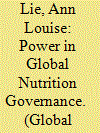

|
|
|
|
|
| Summary/Abstract |
Global public-private partnerships for health and nutrition have proliferated since the 1990s—a trend raising important questions about authority and legitimacy in global governance. Yet within the fields of international relations and public health, there has been only limited empirical research into the global politics and power dynamics behind such partnerships. This article explores how and why the Scaling Up Nutrition partnership was established. Drawing on interviews, observations, and document analysis, it demonstrates how public and private actors exercise combinations of instrumental, structural, and discursive power to normalize and institutionalize their interests and values at the global level. The study highlights as such the complexities behind the increased privatization of global nutrition governance and the importance of power analysis to uncover the normative contestations and asymmetries of power behind global partnership creation.
|
|
|
|
|
|
|
|
|
|
|
|
|
|
|
|
| 6 |
ID:
175395
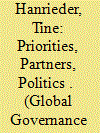

|
|
|
|
|
| Summary/Abstract |
The World Health Organization (WHO) is once more asked to reinvent itself and become more effective. This essay discusses recurrent reform proposals directed at the WHO which, in different ways, ask it to find a strategic focus and thereby its niche in the crowded global health arena. Looking back at decades of reform endeavors at the WHO, it exposes the contradictions and unresolved normative conflicts with regard to the WHO’s priorities. Ultimately, the WHO’s effectiveness hinges on Member State support for public authority in global health, and thus the political commitment to protect it against capture by special interests.
|
|
|
|
|
|
|
|
|
|
|
|
|
|
|
|
| 7 |
ID:
128839
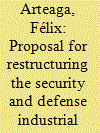

|
|
|
|
|
| Publication |
2014.
|
| Summary/Abstract |
This article describes the state of the Security and Defense Industrial Sector in Spain, its main characteristics and challenges at the turn of an industrial-military cycle. First, it briefly analyzes the potentialities of the sector and its contribution to the national economy. Second, a detailed analysis of the general tendencies of the markets and the new models of collaboration or innovation among stakeholders, as well as the best practices of third actors in adjusting their industrial bases to the changing trends, is carried out. Based on the findings from the previous sections, recommended action lines for government intervention and industry strategies to accomplish a broad restructuring are delineated.
|
|
|
|
|
|
|
|
|
|
|
|
|
|
|
|
| 8 |
ID:
154041
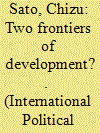

|
|
|
|
|
| Summary/Abstract |
Since the economic crisis of the past decade, public development organizations have increasingly partnered with large private corporations to empower women through business. Existing feminist analyses focus on those public-private partnerships (PPPs) that are global, agenda-setting, benchmarking, and service initiatives. However, there are door-to-door initiatives that aim to empower women at the bottom of the pyramid (BoP) by turning them into entrepreneurs in the global South. At the same time, and unconnected to these Southern initiatives, PPPs in the global North attempt to empower middle-income women to care for distant others by consuming ethically. While these two kinds of PPPs are each identified in their own literatures as new frontiers in development, thus far they have not been studied together. Using transnational feminist literacy practices as a methodology, this paper reanalyzes existing studies on PPPs in the global South and North that target women’s empowerment and have thus far been overlooked. It finds parallels and linkages between PPPs in the global South and North. The use of transnational feminist literacy practices deepens our understanding of the mechanisms by which market-led, corporate-sponsored, “smart economic” and “win-win-win” development approaches, justified in the name of women’s empowerment, obscure and/or transform structural inequalities.
|
|
|
|
|
|
|
|
|
|
|
|
|
|
|
|
| 9 |
ID:
177338
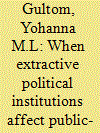

|
|
|
|
|
| Summary/Abstract |
This paper examines how extractive political institutions are associated with the performance of public-private partnerships (PPPs) using the case of the electricity sector in Indonesia, where a political regime shift has impacted the independent power producers’ (IPPs) arrangements in the power generation sector. Using a two-stage empirical strategy (data envelopment analysis and the difference-in-differences regression), I analyzed the economic performance of 20 coal-fired plants for the period between 2010 and 2016 that consists of IPPs endorsed by the two political regimes, both authoritarian and democratic, and the state-owned power plants. The results indicate that the extractive political institutions are associated with a reduced efficiency of the IPPs endorsed by the authoritarian Soeharto regime by −0.135 points, or 0.16% of the mean, showing that across all other power plants that produced the same output, the plants endorsed by the Soeharto regime used input or expenditure 0.16% higher than the average input or expenditure used by other plants. These findings are consistent with the political economy argument that extractive political institutions might have created economic policies that allow for the political elite to extract rents from PPPs.
|
|
|
|
|
|
|
|
|
|
|
|
|
|
|
|
|
|
|
|
|